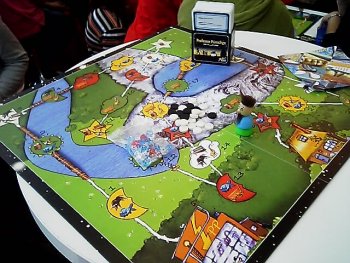![[Headline]](../technik/sonstige/headtran.gif)
![[Headline]](../technik/sonstige/headtran.gif)
![[IMAGE]](../bilder/punschge.jpg) |
Author: Publisher: No. of Players: |
![[IMAGE]](../technik/box/rot/rot-5.gif) ![[IMAGE]](../technik/box/gelb/gelb-6.gif) ![[IMAGE]](../technik/box/grun/grun-10.gif) ![[IMAGE]](../technik/box/pink/pink-8.gif) ![[IMAGE]](../technik/box/blau/blau-7.gif) |
|
A rather strange-looking game is Professor Pünschge which was authored by Klaus Zoch and comes in one of the big gameboxes used by ZOCH. It has a colourful gameboard with a winding track of spaces numbered in increasing order, and each of the spaces is shaped in one of four different shapes, is located on of four possible terrains, contains several recurring symbols and may be on an angled or straight part of the track. During the game, a riddle card will be drawn by one of the players, and all the riddles on the card will be based on principles which can be applied to several of the spaces on the gameboard. A simple principle would be "All spaces which are Star-shaped", whereas other principles may be "Spaces with prime numbers", "All spaces on Woodland terrain" or "All spaces in front of yellow spaces" etc. The player who has drawn the card will move the figure of Professor Pünschge along the track and place a token on the first two spaces to which the principle given on the card will apply, and with this knowledge the other players then must debate which principle might be applicable and which will be the next spaces on the track which will be visited by the Professor. They may place the Professor on the space they deem right, but if the space is not the next correct space along the track, the player impersonating the Professor will make a meeping noise and the Professor stays in place.  The game can be played either in cooperative mode with all players teaming up against the Professor which is played by an other player every round on rotation, but it is also possible to play the game in a competitive way so that each player tries to solve the current riddle himself. To add a measure for the competitive element, crystal-stones have been included and these stones will either be won by the player who solves the riddle or by the player impersonating the Professor if the players should be unable to find out the current principle for some time. The number of possible attempts before the Professor wins will be determined by the Professor player, so that he has a chance to win more crystals if he will give the players more attempts. But on the other hand this increased chance also results in a higher risk for the Professor player, so that he has to weigh his chances upon reading the card. If the players are not successful, they will receive a fixed hint before the Professor wins, and in competitive mode the players also have a chance to help each other if they can agree on a share of the spoils. Whereas the scoring crystals easily can be identified as an artifice to make a basically cooperative game more competitive, the real and interesting challenge of the game is the finding of the applicable principles. To suit different groups of players the playing cards feature principles of five different difficulty levels, going from easy to a very hard level which requires some degree of unusual thinking. Whereas the graphics of the gameboard actually might provoke an impression that the game could be a children's game, it does not seem suitable for children below ten years of age, and it is more suited for adults and older children. As indicated, some of the higher level cards really reuire the players to think outside the box in order to get a grip on which spaces may be visited next by the grumbling Professor, but I think that the game can be really entertaining and communicative if played with a group of players which are willing to face the unusual playing concept. Talking to a ZOCH-Press-representative at the SPIEL 08 convention, the game probably will be available in English shortly, and so I can recommend the game for all players who like to solve some mind-boggling tasks. As I sideline, we also discussed the somewhat unusual cover of the box, and I was given the hint that the artist designed the game as a somewhat ironic homage to Klaus Zoch himself, since he usually leaves his design studio in the evenings with his head full of ideas chasing each other and following some strange algorithms which may be added to new games.  | ||
|
| |

Looking for this game? Visit Funagain Games! |
|
|
| |
|
Impressum / Contact Info / Disclaimer Kulkmann@aol.com
Copyright © 2008 Frank Schulte-Kulkmann, Essen, Germany | |